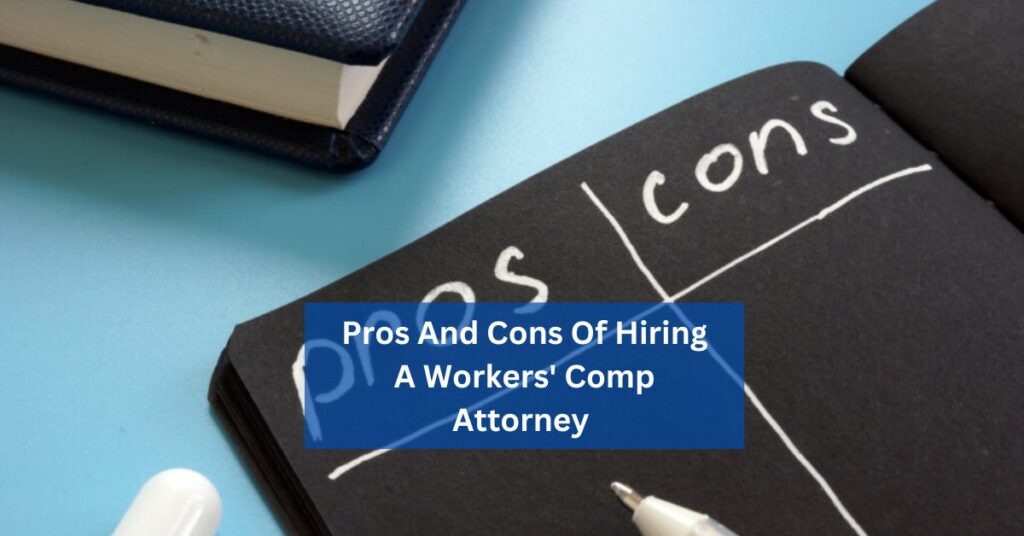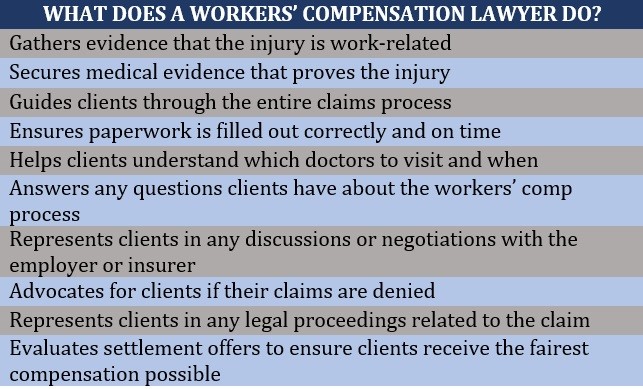Pros And Cons Of Hiring A Workers’ Comp Attorney

Navigating a workers’ compensation claim can be a daunting task, especially when dealing with complex legal processes and insurance companies. In such situations, many individuals contemplate hiring a workers’ comp attorney to assist them throughout the process.
Pros: Expert guidance, maximized compensation, handling paperwork, negotiation skills, representation in court. Cons: Costly fees, potential delays, unnecessary for simple cases, possible conflicts of interest, no guaranteed success.
In this article, we delve into the advantages and disadvantages of enlisting the services of a workers’ comp attorney, providing insights to help you make an informed decision.
Pros Of Hiring A Workers’ Comp Attorney – Don’t Leave Your Benefits On The Table!
1. Expert Legal Guidance:
When you hire a workers’ comp attorney, you gain access to legal expertise tailored to your specific situation. Attorneys specializing in workers’ compensation law possess in-depth knowledge of relevant statutes, regulations, and case precedents. They can provide valuable guidance on how to navigate the legal complexities of your case, ensuring that you understand your rights and options.
2. Maximizing Benefits:
One of the primary advantages of hiring a workers’ comp attorney is the potential to maximize your benefits. Attorneys can assess the merits of your case, determine the appropriate compensation you are entitled to, and advocate on your behalf to secure the maximum benefits available under the law. Whether it involves obtaining medical treatment, wage replacement, or disability benefits, an attorney can help ensure that you receive the full extent of the benefits you deserve.
3. Handling Legal Proceedings:
Workers’ compensation claims often involve various legal proceedings, such as hearings, depositions, and negotiations with insurance companies. Having legal representation can alleviate the burden of navigating these processes on your own. Your attorney can handle all aspects of your case, from gathering evidence and preparing documentation to representing you in hearings and negotiations. This allows you to focus on your recovery while your attorney works to protect your interests.

4. Contingency Fee Arrangements:
Many workers’ comp attorneys operate on a contingency fee basis, meaning they only collect a fee if they successfully secure benefits on your behalf. This fee is typically a percentage of the benefits obtained, making legal representation more accessible to individuals who may not have the financial means to pay upfront legal fees. With a contingency fee arrangement, you can pursue your claim without worrying about upfront costs, providing peace of mind during a challenging time.
Cons Of Hiring A Workers’ Comp Attorney – Consider The Potential Drawbacks Before Committing!
1. Legal Fees:
While contingency fee arrangements can make legal representation more affordable, it’s essential to consider the potential costs associated with hiring a workers’ comp attorney. In some cases, the percentage of benefits collected as a fee may be substantial, particularly if your attorney secures a significant settlement or award. Before hiring an attorney, it’s crucial to discuss their fee structure and ensure that you understand the financial implications.
2. Time and Delays:
While legal representation can expedite the workers’ compensation process in some cases, it can also lead to delays, especially if your attorney is handling multiple cases or facing scheduling conflicts. Additionally, legal proceedings such as hearings and appeals may require additional time to prepare and resolve. If you’re seeking a swift resolution to your claim, it’s essential to communicate your expectations with your attorney and address any concerns about potential delays.
3. Limited Control:
When you hire a workers’ comp attorney, you relinquish some degree of control over the handling of your case. While your attorney is obligated to act in your best interests, their strategies and decisions may not always align with your preferences. It’s essential to maintain open communication with your attorney and voice any concerns or preferences you may have regarding the handling of your case.
4. Complexity of Legal Proceedings:
Workers’ compensation claims can involve complex legal proceedings, including hearings, depositions, and appeals. While an attorney can navigate these processes on your behalf, they may also introduce additional complexities and uncertainties into your case. It’s essential to work closely with your attorney to understand the legal strategies involved and ensure that you are prepared for any potential challenges that may arise.
What Steps Should You Take If You Suffered an Injury at Work? – Take action now to protect your rights!
If you’ve been injured on the job, it’s crucial to take specific steps to protect your rights and ensure you receive the appropriate medical care and compensation. Here’s a more detailed guide on what to do if you’ve been injured at work:
1. Seek Medical Attention: Your health and safety should be your top priority. If you’ve been injured, seek medical attention immediately. Notify your employer about the injury and seek treatment from a healthcare provider. Even if the injury seems minor, it’s essential to get checked by a medical professional as some injuries may worsen over time.
2. Report the Injury: Notify your employer or supervisor about the injury as soon as possible. Many states have specific deadlines for reporting work-related injuries, so it’s crucial to report it promptly. Provide details about how, when, and where the injury occurred. Make sure to document the report in writing and keep a copy for your records.
3. Document the Incident: Keep detailed records of the accident and your injuries. Take photos of the accident scene, your injuries, and any unsafe conditions that may have contributed to the incident. Collect witness statements if possible. This documentation can be valuable evidence if you need to file a workers’ compensation claim or pursue legal action.
4. File a Workers’ Compensation Claim: In most cases, if you’ve been injured on the job, you’re entitled to workers’ compensation benefits. File a claim with your employer’s workers’ compensation insurance carrier. Follow the specific procedures outlined by your employer or state regulations for filing a claim. Your employer should provide you with the necessary forms and information.
5. Consult with a Workers’ Comp Attorney: Depending on the complexity of your case and the extent of your injuries, you may benefit from consulting with a workers’ compensation attorney. An attorney can provide valuable guidance throughout the claims process, ensure your rights are protected, and help you pursue the maximum benefits you’re entitled to.

6. Follow Medical Advice: Attend all medical appointments and follow your doctor’s treatment plan diligently. Failure to comply with medical treatment could jeopardize your workers’ compensation benefits. Keep records of all medical treatment, including doctor’s visits, prescriptions, and rehabilitation therapies.
7. Stay Informed: Educate yourself about your rights under workers’ compensation laws in your state. Understand the benefits you’re entitled to, including medical expenses, lost wages, disability benefits, and vocational rehabilitation. Stay informed about the status of your claim and any deadlines or requirements you need to meet.
8. Appeal if Necessary: If your workers’ compensation claim is denied or you disagree with the decision, you have the right to appeal. Follow the appeals process outlined by your state’s workers’ compensation board or agency. Consider seeking legal representation to help you navigate the appeals process effectively.
By following these steps, you can protect your rights and ensure you receive the necessary medical care and compensation if you’ve been injured on the job.
Read more: Murf – Unleashing Revolutionizing AI-Powered Voice Generation!
When You Need To Hire A Workers’ Compensation Lawyer – Enlist The Expertise Now!
Certainly! Here are some situations where hiring a workers’ compensation lawyer may be necessary or highly beneficial:
1. Denial of Claim: If your workers’ compensation claim has been denied by your employer or their insurance company, a lawyer can help you appeal the decision. They can gather evidence, prepare your case, and represent you during the appeals process.
2. Disputed Benefits: If you’re receiving workers’ compensation benefits but believe you’re entitled to more, or if the insurance company is disputing the extent of your injuries or the amount of compensation you’re owed, a lawyer can advocate on your behalf to ensure you receive fair benefits.
3. Pre-Existing Conditions: If you have a pre-existing condition that’s been exacerbated or aggravated by a work-related injury, the insurance company may try to minimize or deny your claim. A lawyer can help you prove that your work contributed to your injury and ensure you receive the compensation you deserve.
4. Permanent Disability: If your work-related injury has resulted in permanent disability, determining the appropriate amount of compensation can be complex. A lawyer can work with medical experts to assess the extent of your disability and negotiate for fair compensation for future medical expenses and lost earning capacity.
5. Retaliation or Discrimination: If you’re facing retaliation or discrimination from your employer for filing a workers’ compensation claim, such as demotion, termination, or harassment, a lawyer can help you protect your rights and pursue legal action against your employer if necessary.

6. Third-Party Liability: If your injury was caused by a third party, such as a contractor, subcontractor, or manufacturer of faulty equipment, you may be entitled to additional compensation through a third-party liability claim. A workers’ compensation lawyer can help you explore your options and pursue compensation from all liable parties.
7. Complex Legal Issues: Workers’ compensation laws vary by state and can be complex. If your case involves legal issues such as concurrent employment, occupational diseases, or disputed medical treatment, a lawyer with expertise in workers’ compensation law can provide valuable guidance and representation.
8. Settlement Negotiations: If you’re offered a settlement by the insurance company, it’s essential to ensure that it adequately compensates you for your injuries and future expenses. A lawyer can review the settlement offer, negotiate with the insurance company on your behalf, and advise you on whether to accept or pursue further legal action.
Overall, hiring a workers’ compensation lawyer can provide you with invaluable support, advocacy, and expertise throughout the claims process, especially in complex or contentious cases. They can help you navigate the legal system, protect your rights, and ensure you receive the full compensation you’re entitled to for your work-related injury or illness.
Is It Essential To Enlist The Services Of A Workers’ Compensation Attorney – Let’s Find Out!
Whether it’s necessary to hire a workers’ compensation lawyer depends on various factors, including the complexity of your case, the severity of your injuries, your employer’s response to your claim, and your comfort level navigating the legal process. Here’s more information to help you decide:
1. Complexity of the Case:
- If your workers’ comp claim is straightforward, involving minor injuries with clear documentation and a cooperative employer, you may not need a lawyer.
- However, if your case involves disputed issues such as the extent of your injuries, denial of benefits, or disagreements over medical treatment, legal representation may be beneficial.
2. Severity of Injuries:
- If you’ve suffered severe injuries that require extensive medical treatment, long-term care, or have resulted in permanent disability, hiring a lawyer can help ensure you receive adequate compensation to cover medical expenses, lost wages, and future needs.
3. Employer Response:
- If your employer disputes your claim, denies benefits, or retaliates against you for filing a workers’ comp claim, having a lawyer can protect your rights and ensure you receive fair treatment under the law.
4. Legal Knowledge and Experience:
- If you’re unfamiliar with workers’ compensation laws and procedures, hiring an attorney can provide peace of mind knowing that a knowledgeable professional is advocating for your rights and interests.
5. Maximizing Benefits:
- Workers’ comp attorneys have experience negotiating with insurance companies and employers to secure maximum benefits on behalf of their clients. They can ensure you receive all the benefits you’re entitled to under the law.

6. Appeal Process:
- If your workers’ comp claim is denied or if you disagree with the benefits offered, navigating the appeals process can be complex. A lawyer can guide you through the appeals process and represent you in administrative hearings or court proceedings if necessary.
7. Contingency Fees:
- Many workers’ comp attorneys work on a contingency fee basis, meaning they only get paid if you receive benefits. This arrangement can make legal representation more accessible, as you won’t have to pay upfront legal fees.
Ultimately, the decision to hire a workers’ compensation lawyer depends on your individual circumstances and comfort level with the legal process. It may be beneficial to consult with an attorney during a free initial consultation to discuss your case and explore your options.
Frequently Asked Questions:
1. How much does it cost to hire a workers’ comp attorney?
Workers’ comp attorneys typically work on a contingency fee basis, meaning they only receive payment if you win your case. Their fee is usually a percentage of your settlement, typically ranging from 15% to 25%.
2. Do I need a workers’ comp attorney for my claim?
Whether you need a workers’ comp attorney depends on the complexity of your case and your comfort level navigating the legal system. While some claims can be successfully resolved without legal representation, others may benefit from the expertise of an attorney.
3. How long does it take to resolve a workers’ comp claim with an attorney?
The duration of a workers’ comp claim varies depending on factors such as the complexity of the case, the cooperation of the employer or insurance company, and the backlog of cases in the legal system. While hiring an attorney can expedite the process, legal proceedings can still take several months or even years to resolve.
Conclusion:
Hiring a workers’ comp attorney has its advantages and disadvantages, and it’s essential to carefully weigh these factors before making a decision. While an attorney can provide expert guidance, maximize your compensation, and represent you effectively in court.
it’s crucial to consider the associated costs, potential time investment, and the complexity of your case. By understanding the pros and cons of hiring a workers’ comp attorney, you can make an informed choice that best serves your interests and ensures a fair outcome for your claim.
Read more:






